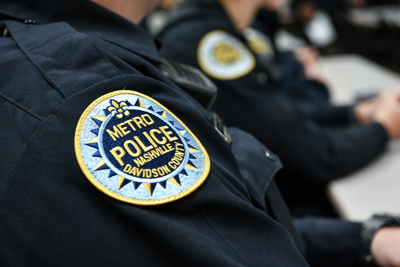I got a lot of feedback on last week’s piece about the police situation here in Nashville, most of it along the lines of, “Well, we have to have police,” and, “So you’re saying we don’t need laws or rules or ...”
So I just want to clarify that I don’t know what should be done. All I know is that right now the conversation dead-ends right here. For myself as well, the conversation hits a wall at, “Well, we have to have police.” I’m not out here advocating for police abolition but I’m also trying to think through these things without letting the conversation stop at these apparent dead-ends.
Recent allegations of MNPD misconduct bring up long-simmering questions about police accountability
Let’s back up. What if we start with something we can all agree on: Something is fucked up in the police department. We went through it last week — a decade of police officers themselves telling the city about a culture of sexual harassment and racial biases and favoritism, and how that leads good cops to leave the job. We have the “Driving While Black” report, which shows that there’s enormous racial bias in traffic stops in town. And now we have whistleblowers’ reports coming out with more of the same.
I would argue that at the root of the problem is the fact that Nashville hired a person who apparently kept silent about an innocent man sitting in prison to run the Office of Professional Accountability. This is not only a knock on OPA Director Kathy Morante, but rather an indictment of [here I’m waving my hands in all the directions] this whole thing. How was “took part in a secret meeting where a bunch of us decided to stay silent about how we knew an innocent person was in prison because it would be too embarrassing to come clean” not immediately disqualifying when she applied for this job? It should surprise no one that the OPA was reportedly thrilled when the state legislature undermined community oversight of policing in this city — not when the department's own director came into the job having kept a secret that ruined an innocent man's life.
Extensive complaint says officials ignored department policy, manipulated investigations, lied about reforms and helped pass a law gutting the Community Oversight Board
This is going in the 2024 entry in the annals of “you knew I was a scorpion when you picked me up.” When police abolitionists tell you that the system is working how it’s supposed to (hence the reason they want to tear down the system), this is the kind of thing they mean. Nashville can say it wants a fair and just legal system, but everyone who was in that meeting to keep that dude in prison went on to have good jobs. They got protected and rewarded. And one of them is the standard-bearer for professional accountability in the police department. So this must be what the system wants — for police and attorneys to privilege saving themselves from embarrassment over transparency that may reveal injustice — because that’s what it rewards. And so here we are.
I have an idea, or more of a thought experiment. It involves Sheriff Daron Hall. Am I still holding a grudge from the time he spoke to a hate group 15 years ago? Sure. Would I more likely vote for a moldy piece of bread than him? Yes. My opinion on Daron Hall is “pbthbpthbpth.” But you know what Hall is used to? Being accountable to the public. You know what Hall doesn’t have? Yearly scandals coming out of his department.
Back in the day — back when Nashville had a city government, not a metropolitan government — the sheriff was traditionally a corrupt piece of shit who delivered elections for politicians and otherwise ran rural Davidson County like Boss Hogg. He was as powerful and equal to the Nashville chief of police. But when Nashville was consolidating, we didn’t need two separate but equally powerful policing units over the same territory. So we defanged the sheriff’s office. Now it runs the jail, provides courthouse security, picks up bulk trash and ... well, I’m sure some other stuff.
But what if we bet on the wrong horse? What if instead of making Nashville police the primary law enforcement unit, we’d made it the sheriff’s department? We could have.
I heard the mayor on the inaugural episode of City Cast: Nashville. (I don’t know how often this podcast is going to transform into City Cast: The Nashville Scene’s Chris Crofton Fan Club, but it’s already happened once, so, you know, worth listening to if you’re a Crofton fan.) He called the police an institution that must persist. And that may be the case. But we also have another law enforcement team in the city — the sheriff’s department. Is it worthwhile to think about moving the police under the sheriff’s department? Or maybe just moving the Office of Professional Accountability to the sheriff’s department? Is there some way we can utilize the law enforcement officer who seems to be running his department with little scandal to help lessen the habitual scandalousness of the police department?
Or do we think Sheriff Hall is more motivated to keep his side of the street clean, so to speak, because he’s an elected official? And if so, does that suggest that we should consider making the chief of police an elected position? Again, I don’t know. But it’s worth asking ourselves if, even if the police must persist, do they have to persist this way?







